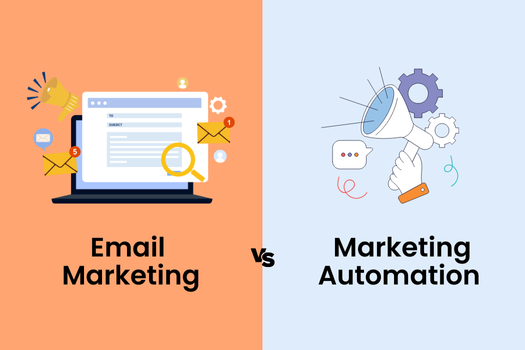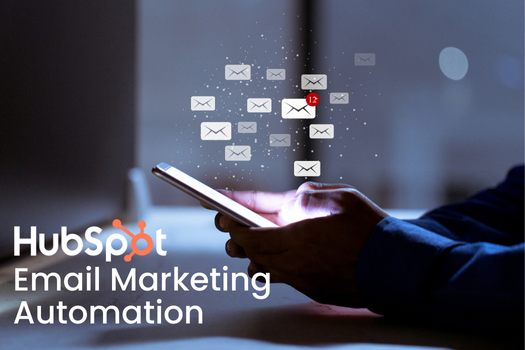Contents
- What is Email Marketing?
- Advantages of Email Marketing
- What is Marketing Automation?
- Advantages of Marketing Automation
- Email Marketing vs Marketing Automation: Key differences
- Email Marketing vs Marketing Automation: Similarities
- Why Can Having the Right Marketing Automation Specialists Help Do Both?
- How do you choose the right strategy for your business?
- How to integrate email marketing and marketing automation?
- Which Strategy is Right for You?
Choosing between email marketing and marketing automation can be confusing, especially since the two are often used interchangeably.
Businesses need efficient strategies to connect with their audiences and achieve their goals. Email marketing and marketing automation are powerful approaches often misunderstood or used interchangeably.
This usually happens because both rely heavily on email as a key communication channel.
Email marketing focuses on sending personalized messages to build relationships and drive sales. However, email marketing vs. marketing automation reveals a significant difference: marketing automation goes further, allowing you to manage customer interactions across multiple channels, analyze behavior, and send personalized content at scale.
In this guide, we will differentiate between email marketing and marketing automation, their benefits, and how you can leverage both to improve your marketing strategy.
What is Email Marketing?
Email marketing is an online marketing strategy businesses use to reach potential customers, nurture leads, and communicate directly with their audience.
It is a more traditional approach focusing on building relationships and promoting products or services through email.
Key components of email marketing include:
-
Building and maintaining an email list
-
Creating engaging email content
-
Segmenting your audience for targeted messaging
-
Designing visually appealing email templates
-
Tracking and analyzing email performance metrics
Many businesses prefer email marketing to other strategies like social media marketing, SEO, and PPC due to its impressive ROI, high sales conversion rates, and cost-effectiveness.
While email marketing involves direct manual communication with subscribers, email marketing automation uses tools and software to streamline and optimize your email marketing strategy, offering benefits like dynamic content, send time optimization, and automated sequences.
Advantages of Email Marketing
Email marketing offers several advantages that make it a popular choice for businesses:
Direct Communication: Emails are sent straight to the recipient's inbox, providing a direct line of communication without intermediaries.
High ROI: Email marketing consistently delivers an impressive return on investment, with studies showing an average return of $36 for every $1 spent.
Cost-Effectiveness: Unlike many other marketing strategies, email marketing is highly cost-effective, making it accessible for businesses of all sizes and budgets.
Performance Analytics: Email marketing allows you to track important metrics like open rates, click-through rates, and conversion rates, helping you understand and improve your campaign performance.
Personalization at Scale: With list segmentation, dynamic content, and lead scoring, you can send personalized emails and product recommendations to subscribers at scale.
These benefits make email marketing a must-have tool, especially for small businesses and those just starting with digital marketing.
What is Marketing Automation?
Marketing automation involves using software to streamline and optimize your marketing processes across multiple channels from a single platform.
It goes beyond simple email scheduling to involve various marketing activities, such as lead generation, segmentation, customer journey mapping, and multi-channel campaign management.
Key features of marketing automation include:
-
Managing marketing efforts across multiple channels (email, social media, SMS, web personalization)
-
Scheduling and publishing social media posts
-
Lead scoring and prioritization
-
Personalizing website content and recommendations based on user behavior
-
Capturing and collecting leads through web forms, landing pages, and polls
When implemented effectively, marketing automation allows you to increase communication with customers across multiple channels and have access to data from all past and present customer interactions, thanks to its seamless integration with CRM tools.
Advantages of Marketing Automation
Marketing automation offers several powerful advantages for businesses ready to take their digital marketing to the next level:
Advanced Lead Scoring: Marketing automation provides deeper insights into customer preferences beyond what email marketing can offer, allowing for more effective lead prioritization and personalized messaging.
Multi-Channel Marketing: Manage your marketing actions across various platforms from a single dashboard, ensuring consistent brand messaging and efficient resource allocation.
Advanced Integration: Marketing automation tools can integrate with other platforms and tools, streamlining your sales process and allowing for more comprehensive tracking of customer interactions.
Scalability and Efficiency: Handle complex marketing campaigns easily, saving time and significantly reducing human error.
Ads Retargeting: Implement effective ad retargeting strategies to increase conversion rates by up to 150%.
By leveraging marketing automation, businesses can deliver personalized experiences at scale, making it a game-changer for growth-oriented organizations.
Email Marketing vs Marketing Automation: Key differences
While both strategies involve email as a communication channel, Email Marketing vs. Marketing Automation differs significantly in functionality, scope, and complexity. Let’s break down the key differences.
Scope of Features and Supported Marketing Activities
Email marketing focuses mainly on managing email lists, creating campaigns, designing content, and analyzing email performance. It has a limited scope compared to marketing automation, which covers a broader range of marketing activities.
Marketing automation integrates email marketing with other channels, such as social media, SMS, content personalization, lead scoring, and more.
Lead Management and Customer Data Collection
Email marketing gathers basic customer data, but marketing automation takes it further by collecting data from multiple channels. This allows for better insights into the customer journey.
Marketing automation tools help marketing and sales teams track and score leads, enabling personalized communication. This improves team coordination and ensures that high-priority leads receive the right content.
Campaign Complexity and Management
Email marketing is effective for simple email campaigns, but marketing automation is better suited for complex campaigns.
For example, if two prospects receive the same email but take different actions, marketing automation can send follow-up emails based on their behavior. It can track interactions across various touchpoints (website, support team, social media) and create more sophisticated and personalized marketing strategies.
Level of Automation
Email marketing offers basic automation features like scheduling emails, autoresponders, and simple trigger-based workflows. These are mostly limited to email-related tasks.
On the other hand, marketing automation handles complex workflows, automates multi-channel marketing, tracks customer behavior, and personalizes messages across different touchpoints.
Price Point and Program Complexity
Email marketing is generally more affordable, with many free plans and a shorter learning curve. It’s ideal for smaller businesses or those just starting with marketing technology.
Marketing automation tools are more expensive due to their advanced features and complexity. They are typically designed for medium to large businesses with more complex marketing and sales processes.
Understanding these differences can help determine which strategy aligns with your business goals and resources.
Email Marketing vs Marketing Automation: Similarities
The good news is that you don’t have to choose one. Combining both strategies in the Email Marketing vs. Marketing Automation debate can yield the best results.
High ROI: Both strategies offer impressive returns on investment when implemented effectively.
Email as a Channel: Email marketing is one of the channels that marketing automation incorporates, with 65% of users implementing it in their marketing automation for increased customer interaction and sales.
Lead Generation: Both strategies excel at lead generation and nurturing, allowing segmentation and personalized communication.
Increased Efficiency: Both email marketing and marketing automation automate repetitive processes, saving time and reducing workload on business staff.
Tired of seeing your emails land in spam folders?
Why Can Having the Right Marketing Automation Specialists Help Do Both?
The right marketing automation experts can help you combine the effectiveness of email marketing with the efficiency of automation, unlocking a seamless, results-driven marketing approach.
Why Saffron Edge Should Be Your Top Choice for Both
Expertise Across Strategies:
Saffron Edge has a team of specialists who are experienced in email marketing and marketing automation. They know how to design campaigns that engage audiences and leverage automation tools to simplify complex workflows.
Seamless Integration:
Whether you want to focus on traditional email marketing or adopt advanced automation techniques, Saffron Edge ensures a smooth integration of both strategies. Their solutions allow businesses to operate efficiently while keeping customer engagement at the forefront.
Personalized Campaigns:
Our team specializes in personalization, crafting tailored messages that resonate with your audience. By combining data insights with creative strategies, they deliver impactful campaigns that drive engagement and build long-term relationships.
End-to-End Service:
From planning and implementation to monitoring and optimizing campaigns, Saffron Edge offers comprehensive support at every stage. Their hands-on approach helps businesses harness the full potential of email marketing and automation tools.
Focus on Results:
Saffron Edge emphasizes ROI-driven solutions, ensuring that every campaign delivers measurable outcomes. Whether boosting conversions or improving customer retention, their strategies are designed to meet your growth goals.
How do you choose the right strategy for your business?
These factors can help you decide how to leverage Email Marketing vs. Marketing Automation to maximize your marketing effectiveness and achieve your business objectives.
Team Proficiency: Email marketing might be the better choice if your team is not advanced enough to handle marketing automation and your marketing needs don't require it.
Customer Lifecycle: Email marketing may suffice for short sales cycles. Marketing automation can help nurture leads across multiple platforms for longer, more complex customer journeys.
Detailed Reporting: Marketing automation offers more robust reporting capabilities if you need comprehensive insights into customer behavior across multiple platforms.
Budget: While marketing automation can increase productivity and reduce overhead costs, it typically requires a higher initial investment than email marketing.
Integrating email marketing with automation allows you to create a powerful marketing ecosystem that works seamlessly to achieve your goals.
How to integrate email marketing and marketing automation?
Integrating email marketing with marketing automation creates a comprehensive system that benefits from the strengths of both strategies. Businesses can use email marketing for timely newsletters and promotions while relying on automation to manage complex workflows like onboarding, lead nurturing, and re-engagement.
Automation tools can enhance email marketing by analyzing user behavior, enabling better segmentation and personalized content delivery. This synergy helps businesses create a seamless experience for their audience and significantly improves campaign outcomes.
Rather than choosing between email marketing and marketing automation, many businesses find success in integrating both strategies. Here are practical examples of how they can work together:
Suppose you use marketing automation to score and segment leads based on their behavior. Then, you can use email marketing to send personalized emails to each segment, customizing your message based on their interests and engagement level.
Another example is if you gain leads through web forms or multi-channel marketing efforts, you can use automated email sequences to nurture and guide them through your sales funnel.
Which Strategy is Right for You?
Choosing between email marketing and marketing automation depends on your business needs, resources, and goals.
For smaller businesses or straightforward campaigns, email marketing is a reliable option. Marketing automation is the way forward for businesses looking to scale and manage complex processes.
Consider your objectives carefully, and remember—you can always combine the two to get the best of both worlds.
Both offer great benefits and are powerful tools for digital marketing. For many, the ideal solution is integrating both using email marketing within a marketing automation framework for a more efficient and scalable strategy. Thoughtfully integrating these tools helps create campaigns that truly engage your audience.
Ready to elevate your marketing strategy? Contact us at Saffron Edge for expert guidance on implementing the right email marketing and marketing automation mix for your business.
What if your email open rates could be 10X?
Get The Marketing Automation Toolkit
Frequently Asked Questions
What is the difference between email marketing and marketing automation?
Email marketing involves sending targeted messages to your audience to promote products or services. Marketing automation, on the other hand, involves using software to automate multi-channel marketing processes, manage customer relationships, and deliver personalized content at scale.
Can you use email marketing without marketing automation?
Yes, you can use email marketing independently. It involves sending out individual email campaigns or newsletters. However, marketing automation can enhance email marketing by automating follow-ups, segmenting audiences, and triggering personalized messages based on user behavior.
Which is more effective: email marketing or marketing automation?
It depends on your goals. Email marketing is effective for simple campaigns and one-off communications. However, marketing automation is more effective if you need to nurture leads over time, engage with customers based on their actions, and maintain consistent interaction across multiple channels.
How can marketing automation improve email marketing?
Marketing automation enhances email marketing by automating workflows, segmenting your audience based on behavior, scheduling emails, and sending personalized follow-up emails. This helps you engage customers more effectively and efficiently.
What are the main benefits of marketing automation over email marketing?
Marketing automation allows for better lead nurturing, more detailed analytics, multi-channel integration (email, SMS, social media), and the ability to send personalized content at scale. Through automation and data-driven insights, it can save time and improve campaign ROI.
Is marketing automation more expensive than email marketing?
Generally, yes. Marketing automation tools are often more expensive because they offer a broader range of features, such as lead scoring, multi-channel messaging, and advanced analytics. Email marketing tools tend to be less expensive and focus on basic functions.
Which strategy is better for small businesses: email marketing or marketing automation?
Due to budget constraints, small businesses might start with basic email marketing. However, as they grow and need more sophisticated engagement strategies, investing in marketing automation can help them scale their efforts effectively and manage larger campaigns.
Can marketing automation integrate with other marketing tools?
Yes, marketing automation platforms can often integrate with other tools such as CRM systems, analytics platforms, social media schedulers, and e-commerce platforms, allowing for a seamless flow of data and more comprehensive marketing strategies.
What type of content can be automated through marketing automation?
Marketing automation can handle a variety of content, including welcome emails, drip campaigns, abandoned cart reminders, post-purchase follow-ups, newsletters, and re-engagement campaigns.
How do I decide if I need email marketing or marketing automation?
Assess your business needs and goals. Email marketing may suffice if you focus on simple campaigns and occasional outreach. Marketing automation is the better choice if you need to nurture leads, send targeted content based on user behavior, and streamline processes across channels.
Related Blogs
We explore and publish the latest & most underrated content before it becomes a trend.
8 min read
10 Best SEO Companies to Drive Higher ROI in 2025
By Nishant Ahlawat4 min read
The Ultimate Guide to HubSpot Email Marketing Automation To Maximize Business Growth
By Sabah Noor
Subscribe to Saffron Edge Newsletter!

Get The Marketing Automation Toolkit










